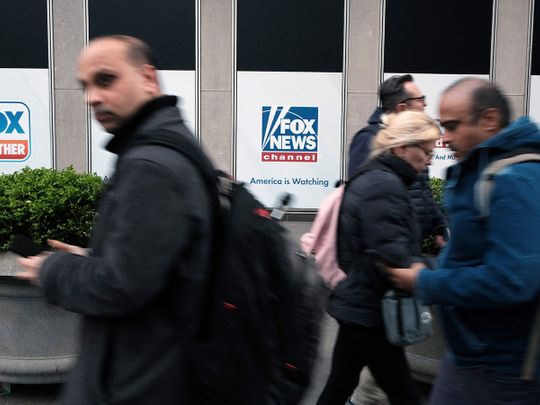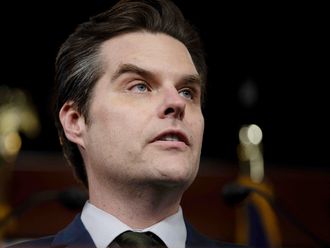
WILMINGTON: Fox News agreed Tuesday to pay $787.5 million to Dominion Voting Systems, settling a lawsuit brought by a company that was repeatedly smeared on air with fantastical claims of helping to rig a presidential election and marking an abrupt end to one of the most consequential and closely watched media cases in decades.
The eye-popping figure - the largest publicly disclosed monetary settlement ever in an American defamation action - averted what could have been an even costlier outcome for Fox and its parent company, Fox Corp., had the suit gone to a jury. Dominion had sought $1.6 billion, and several pretrial rulings had strengthened its claims.
The settlement agreement came with only a grudging acknowledgment by Fox that it had been wrong in repeatedly airing false statements that backed up President Donald Trump's bogus claims of election fraud after the 2020 election. Fox's hosts and guests had repeatedly depicted Dominion, the maker of voting machines and software, as at the heart of a conspiracy to change votes to hand Joe Biden the election.
"We acknowledge the Court's rulings finding certain claims about Dominion to be false," the cable network said in a statement following the news that it would no longer contest Dominion's allegations in court. "This settlement reflects Fox's continued commitment to the highest journalistic standards. We are hopeful that our decision to resolve this dispute with Dominion amicably, instead of the acrimony of a divisive trial, allows the country to move forward from these issues."
The parties came to a last-minute deal that was announced just after a jury was selected to hear the case and just before opening arguments were slated to begin in a superior court in Delaware - Biden's home state.
"The truth has meaning," said a lawyer for Dominion, Justin Nelson, in remarks delivered outside the courthouse. "Lies have consequences." The settlement agreement, he added, "represents a ringing endorsement for truth and democracy."
The settlement ends a humiliating chapter for Fox and its chairman, Rupert Murdoch, the 92-year-old billionaire media mogul. Through pretrial discovery that resulted in the release of hundreds of thousands of pages of emails, texts and other communications, Dominion showed that Murdoch, as well as Fox's executives and producers, were aware that Trump's claims of election sabotage were suspect, but permitted hosts and guests to perpetuate them to keep viewers from switching to other channels.
Murdoch, who was expected to testify at the trial, said in a deposition that he didn't believe Trump's claims but decided not to intervene as Fox hosts such as Sean Hannity, Maria Bartiromo and Jeanine Pirro repeatedly bashed Dominion.
Dominion was prepared to show that Fox feared the defection of viewers, despite knowing it was airing falsehoods, subjecting the network to a public-relations beating during a trial that had been expected to last six weeks. Murdoch evidently calculated that settling with Dominion would be far less expensive, from both a reputational and a monetary perspective, than taking the gamble of a trial and an adverse jury verdict, which could have exceeded Dominion's own damage claim.
As is, the $787.5 million settlement may be the largest ever in a defamation case, although it's difficult to know for certain because settlements are often confidential.
"Fox News must have been terrified to face a jury with the evidence," said defamation attorney Charles Harder, who previously represented Trump and pro wrestler Hulk Hogan in libel and invasion-of-privacy actions against media companies.
The settlement was cheered by some First Amendment advocates, who argued that Fox's actions had gone beyond those typically protected by the high bar courts have traditionally set to prove defamation. Katie Fallow, senior counsel at the Knight First Amendment Institute at Columbia University, said that "the evidence gathered by Dominion suggests that Fox News crossed the line from simply reporting on the 'Big Lie' to knowingly spreading misinformation. This is the rare case where imposing financial liability on a media outlet for publishing false statements seems to be justified."
The settlement does not require Fox to issue an on-air correction or apology, according to two people close to the network. Instead, the company's statement was read on Fox's airwaves Tuesday by Fox media reporter Howard Kurtz, who has covered the trial for the network and attended the court hearing in person. During an appearance Tuesday afternoon, Kurtz referred to the statements made on Fox in the weeks and months after the 2020 election as "obviously false" and "conspiracy theories."
Asked why Fox won't have to apologize as part of the settlement deal, a Dominion spokeswoman said: "An apology is about accountability, and today Dominion held Fox accountable. Fox paid a historic settlement and issued a statement acknowledging that the statements about Dominion were false."
The end of the dispute with Dominion doesn't end Fox's legal troubles stemming from the 2020 election. It still faces a defamation suit from another voting-tech company, Smartmatic, which is seeking $2.7 billion in damages. Settling the Dominion case could raise the possibility of a settlement with Smartmatic, which has made claims similar to Dominion's.
The settlement with Dominion was characteristic of Murdoch and Fox, which have a history of burying alleged misconduct with payments before a dispute reaches trial. Before Dominion, the known cumulative amount of its settlements over the past 13 years had approached three-quarters of a billion dollars.
Other Murdoch-run subsidiaries paid more than $100 million in 2011 and 2012 to celebrities and crime victims whose phone messages were hacked by his British tabloids. Fox paid $50 million in 2016 to women who alleged sexual harassment by Fox News co-founder Roger Ailes and then-host Bill O'Reilly.
The Dominion settlement came after Delaware judge Eric M. Davis issued several pretrial rulings in March that significantly narrowed Fox's avenues for defending its conduct.
The judge ruled, for instance, that the network could not dispute that it aired false, harmful statements about Dominion, though it could contest whether it did so with "actual malice" - that is, with knowledge that the statements were false or without regard to their truth or falsity. Plaintiffs must establish that a defendant acted with actual malice to prove a libel or defamation claim under a nearly 60-year-old standard established by the Supreme Court.
Some legal scholars had called Davis's ruling disastrous for Fox because it stripped away a key line of defense - that the network's hosts were merely reporting and commenting on newsworthy claims. It would have forced Fox to defend a blizzard of false statements uttered by Hannity, Pirro, Bartiromo and former host Lou Dobbs.
The end of the Fox-Dominion dispute came after months of bitter rhetoric between the two parties and followed revelations that exposed the lengths to which Fox was willing to go to support Trump's discredited claims that he was cheated out of a second term.
The network aired multiple interviews with Trump-associated lawyers Rudy Giuliani and Sidney Powell in which they made wild claims about Dominion's software. Dobbs, Bartiromo and other hosts sometimes added supportive commentary.
Dominion showed through pretrial discovery of memos, texts and emails that Murdoch, Fox News chief executive Suzanne Scott, and hosts such as Hannity and Tucker Carlson doubted Trump's allegations and considered Giuliani and Powell unreliable. At one point, Carlson privately referred to Trump as "a demonic force" and wrote that he hated him "passionately."
But the network kept pushing the conspiracy storyline, spooked by worries that viewers would abandon Fox and turn to far-right networks like Newsmax and One America News if Fox didn't support Trump's false claims. (Dominion has also sued Newsmax and OAN.) Scott, the CEO, appeared to be especially concerned, disparaging Fox journalists for the manner in which they combated the misinformation.
The settlement ends Fox's aggressive efforts to rebut Dominion's allegations. For months, its spokespeople accused Dominion of "cherry-picking" statements from pretrial evidence to gin up anti-Fox headlines. The network repeatedly cited the First Amendment and said that if Dominion prevailed, the verdict would "prevent journalists from basic reporting" on newsworthy events.
It also said Dominion's proposed monetary damages, $1.6 billion, were grossly inflated by Dominion's "opportunistic private equity owners" in light of the company's revenue and valuation.
The "stolen election" narrative perpetuated by Trump and amplified by Fox eventually culminated in a mob attack on the U.S. Capitol on Jan. 6, 2021, as Congress met to certify the electoral college results, though the judge had ruled that Dominion could not tell a jury that Fox's broadcasts influenced the events of that day.
For Dominion, the settlement averts what probably would have been a lengthy legal fight even if it had won at trial. Fox's legal advisers said they believed the network could have prevailed on appeal - a process that would probably have taken years and delayed any financial redress.
The $787.5 million price tag for Fox's settlement with Dominion Voting Systems amounts to almost one-fifth of the company's cash on hand, a sizable hit to the company's bottom line, although it's not clear if insurance will cover some of Fox's liability. Fox Corp. chief executive Lachlan Murdoch told analysts in February during an earnings call that the company had about $4 billion in cash on hand.
The settlement was disclosed after the close of the stock market. In after-hours trading, Fox Corp. stock was down less than 1 percent.






